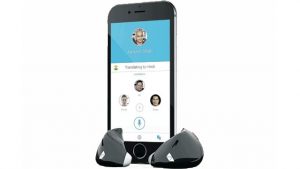 Ever travelled to a foreign country and thought ‘if only I could understand their language’? Or maybe you plan to live and work or study in a country where English just isn’t spoken.
Ever travelled to a foreign country and thought ‘if only I could understand their language’? Or maybe you plan to live and work or study in a country where English just isn’t spoken.
Well, what if you were able to hear word for word in real time what a foreigner is saying to you?
Waverly Labs, a tech start-up in New York, United States, is developing a smart earpiece, called ‘Pilot’, to erase language barriers and allow users to converse freely.
“Being lost in translation has happened to everyone, even us, and that’s exactly how the idea was born. Pilot includes a second earpiece for wireless music streaming and a mobile app, which toggles between languages. It’s a dream of a life untethered, free from language barriers,” said Waverly.
The device, which is scheduled to be released in May 2017, is a pair of ear buds — one for each speaker — that work in conjunction with a mobile translation app.
According to the developers, the Pilot earpiece uses specially designed, dual noise-cancelling microphones to filter out ambient noise from the speech of someone talking. Then, the speech is passed through the smartphone app where the translation process occurs.
The first step of the translation process is speech recognition, the second is machine translation, then speech synthesis. This all happens simultaneously without interruption, as each person speaks to one another, explained Waverly.
The first version of the Pilot speech translation app is to be released this month on the i0S and Android platforms.
Waverly said the app will offer speech translation of only five languages, including English, Spanish, French, Italian and Portuguese.
“In an effort to provide users with the best quality translations, speech translation will be limited to European/ Latin languages.” However, the device allows text translations for other languages, language dictionaries for phrases of common translations, and a support of various dialects and pronunciations.
Users will also be limited to writing, reading and speaking as the full conversational system will only be available when the device is released next year.
Currently, translation is delayed by a few seconds but the developers said it is working hard to shorten the lag and promises to release updates to the app with every improvement.
Waverly also noted that translation is not perfect as some mistakes will be made. However, the more people use it the better the translation engine becomes.
And, for potential buyers who might be wondering if Pilot will translate everything around them, the answer is no. “This first-generation does not translate everything happening around you. It only translates with people who also have the Pilot earpiece. Future generations will be developed to translate everything around you,” said Waverly.
Despite its current limitations, Pilot gives credence to hopes of a limitless world where language is no longer a major factor in conversations.
